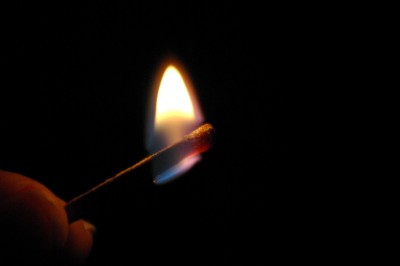 Editor’s note: This is the first in a two-part series. Next installment: Long-term power outages.
Editor’s note: This is the first in a two-part series. Next installment: Long-term power outages.
Electrical power outages are becoming more and more common. With the condition of our aging electrical grid, this really shouldn’t come as much of a surprise to us.
We’ve become a society that is addicted to electrical power. We depend on it for so much of what we do, that losing power, even for a short period of time, can carry disastrous and expensive consequences.
When we talk about a short-term power outage, we’re really talking about something that lasts only a few hours — a day at most. That’s a short enough period of time that we can manage to survive it fairly well, even if it does require us doing some things a bit differently.
Of course, being prepared for a power outage makes it much easier to survive. Like any other problem in life, preparation is a large part of overcoming it. For each of the essential things we use electrical power for, we need some sort of alternative, so that when the power goes out, we’re all ready for it. So, what are those critical electrical usages?
- Refrigeration
- Cooking
- Heating and Cooling
- Lighting
- Communications
- Work (computers more than anything else)
There are also a whole lot of non-critical uses we have for electricity — especially those that are associated with entertainment. While it’s nice to be entertained, that really isn’t all that important. We can get by for a day without our Nintendo systems and tablets. We just have to find other ways of keeping ourselves occupied.
1. The First Thing You Should Do
In any power outage, the first thing you should do is to unplug all electrical equipment, especially anything that might have a computer chip in it. This includes entertainment centers, stereos, computers, copying machines and their accessories. Many times, when the power comes back on, there is a surge of power, which can damage this equipment. Of course, if your equipment is connected through a good surge protector, this won’t be necessary.
Harness the power of the sun when the power goes out…
Many people have a generator on hand to provide electrical power in the case of a power outage. While there’s nothing wrong with that idea, generators use a lot of gasoline – and they’re noisy and emit fumes. One good option is solar power, either as backup power or primary power. That way, you can continue life even when lightning strikes.
2. Monitor refrigeration
Refrigeration is probably the most critical item for most people. Fortunately, refrigerators are well-insulated, allowing them to keep the food inside cold for a minimum of four hours, without any electricity. A freezer will keep food frozen for up to 48 hours if it is full. However, if the freezer is only half full, it will only keep the food cold for about 24 hours. So, it’s better to keep your freezer full, so that it can keep your food cold if the power goes out.
If you don’t normally keep enough food on hand to fill your freezer, you can easily fill the remaining space with containers of ice. Not only will that help to keep the food frozen, but some of the ice can be moved to the refrigerator in the case of a power outage, in order to keep the food in the refrigerator from spoiling.
Don’t assume that just because you lose power for a day, that all of the food in your refrigerator is spoiled. We are accustomed to keeping foods refrigerated here in the United States, even if they don’t need it. Many foods which are marked “refrigerate after opening” will keep fine without it.
Story continues below video
One of the most surprising of these is mayonnaise. We’ve probably all heard that anything with mayonnaise in it will spoil very quickly without refrigeration. Yet in Mexico, the very same mayonnaise that we refrigerate is commonly stored in a kitchen cabinet or out on the counter top. I’m not talking about for a few minutes or hours, I’m talking about for weeks, without spoiling.
So, when the power comes back on, don’t just throw things out. Check each and every container individually, to see if it has spoiled or not. If there is no mold and no smell of decay, then it is probably OK to use. Frozen food that has thawed out can always be cooked, and then if it’s not going to be consumed right away, it can be re-frozen.
3. Be creative in cooking
Most of us depend upon electricity for cooking, at least to some extent. In the event of a power outage, you’re better off having a gas range in your kitchen than an electric one. The gas one will continue to work, as long as there is gas in the pipes. An electric one, like a microwave, won’t do you much good at all.
The easiest alternative for cooking without electricity is to use a barbecue grill. Most families have one for cooking hamburgers and steaks. You can just as easily use it for cooking a pot of spaghetti or beans. Just put the pot on the grill and cook away. While you might have to get used to some difference in cooking times and temperatures, that barbecue grill will do just as good a job of cooking your food as your kitchen range will.
4. Don’t panic: heating and cooling
Our heating and cooling systems all require electricity to function; that is, unless you heat your home with a wood burning stove. Even gas furnaces require electricity to operate, as the controls and blower motor are powered by electricity.
Depending upon the outside temperature and the R-factor of the insulation in your home, it will take a number of hours for your home to cool down or heat up during a power outage. For a short-term outage, you may be able to get by without having to worry about heating and cooling. Unless it is extremely cold outside, your home should stay warm enough for survival without using any alternative form of heat.
That’s not to say that your home will necessarily stay warm. You will gradually see the temperature drop inside your home, until it matches the outside temperature. To combat this, add layers of clothing. There are many places in the world where people don’t have any heating in their homes. They keep warm in the winter by wearing layers of clothing, wearing coats in their homes and piling more blankets on their beds.
5. Go retro with lighting
Lighting is one of those areas that you will need a little bit of preparation for. Flashlights will provide light for you, but only for as long as the batteries last. Besides, it’s hard to work with a flashlight in your hands. You’re better off using candles and oil lamps, saving the batteries in your flashlight until you really need to use a flashlight.
Most of us have candles in our homes, even if they are just decorative ones. The best types of candles to have for an emergency are large diameter ones. Tapers and other thin candles are very inefficient, because they tend to drip more wax than they burn.
In olden times, they made candles that provided more light by adding additional wicks. If you make your own candles, try making them with three to six wicks in them. Each one will provide the light of one candle; so a six wicked candle will provide you with six candlepower of light. Keep the wicks at least a half inch apart, so that they don’t disturb one another. If you make those candles in old jars, you can be sure that all of the wax will be used and none will drip off to be wasted.
Oil lamps provide even more light than candles, mostly because they use a larger wick, so more oil can burn at one time than what burns in a candle. They will also burn just about any type of oil. While the mineral oil that is intended for use in an oil lamp is the best to use, as it doesn’t smell bad, you can also burn cooking oil if you need to.
6. Don’t abandon communication
There are two types of communications you’ll need to be concerned about: talking to people and getting news. Your cell phone should provide you with communications, even during a power outage. Typically, the cell phone towers have emergency power so that they will continue working even in the midst of a power outage.
An Amazing Breakthrough In Compact Portable Backup Power!
It would be a good idea to have a disposable cell phone on hand, from another carrier. That way, if your main cell phone loses service, there’s still a chance that you’ll have communications via that alternate carrier. You should also have a hand-crank or battery powered charger for your regular cell phone, so that you can recharge it, even if the power is out.
A battery powered AM/FM radio will give you the capability of receiving the news and finding out what is going on. Keep a list of the local radio stations, especially talk radio, as they will give you the most accurate and up-to-date reports. Make sure you have an adequate supply of batteries for the radio.
7. Have battery backups – especially for work
The ability to work is the one thing that suffers the most when electrical power is lost. So many jobs today require the use of computers and other electronic equipment. If you work outside the home, there is a good chance you will be sent home if it looks like the outage is going to last for more than a few hours.
With a laptop computer, it is possible to continue doing many types of work. However, that is limited by the life of the computer’s battery. Some laptop computers can only be used for about an hour on the power that the battery holds. The next time you shop for a laptop, be sure to keep that in mind. Some companies, like this one, also sell backup batteries that can recharge everything from a cell phone to a laptop during a blackout. They are very convenient if the power goes out.
You can operate your computer off of your car’s battery, if you have the right sort of adapter. Adapters are available for just about any voltage and connector style, so this is more an issue of planning ahead and making sure that you have the right sort of adapter. You can also make an extension so that you can connect your laptop to your car battery for power and use the computer in a more convenient location.
Sign up for Off The Grid News’ weekly email and stay informed about the issues important to you











